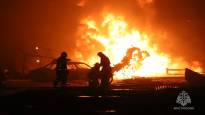Jussi Lassila, a researcher at the Foreign Policy Institute, does not necessarily consider the explosion at the gas station in Dagestan to be sabotage by the Ukrainians. The reason may also be the dissatisfaction of the people of Dagestani with the energy supply.
There have been several explosions in Russia recently, the cause of which was not immediately clear. The most recent of these incidents is the devastating gas station explosion in Dagestan.
Senior researcher at the Foreign Policy Institute Jussi Lassila directly does not warm to the idea that the explosion in Dagestan is part of a sabotage campaign by Ukrainian groups on Russian soil.
He prefers to link the accident to internal affairs in Dagestan, where there have been recent demonstrations protesting constant power outages and poor energy supply.
– Could this be connected to the fact that someone blew up things related to fuel, Jussi Lassila thinks.
Even if he doesn’t necessarily like the gas station explosion to have been carried out by the Ukrainians, the option is not completely ruled out either.
Jussi Lassila reminds that it is also good to keep in mind the carelessness and indifference associated with the Russian operating culture.
– As a result of these, there are all kinds of explosions in Russia.
Such accidents increase during war because, for example, ammunition stores are moved and ammunition is handled more.
Drone strikes incite fear
Jussi Lassila says that it is difficult to assess who or which groups are behind other recent attacks in Russia.
– For example, the drone strikes deep in Russia have not been very destructive in terms of destructive power.
The targets of the attacks are not directly related to warfare. Among other things, they have been administrative buildings.
Jussi Lassila estimates that they have had a general deterrent effect or a psychological effect in Russia.
Sabotage, yes, but by whom
On the other hand, bigger explosions and fires are connected to the army and warfare. The targets of the attacks have been ammunition depots and army subcontractors.
– The circumstances of these attacks suggest that they are sabotage.
According to Jussi Lassila, it is often a matter of guesswork whether Ukrainian groups are behind the attacks or whether the attacks are more of an internal Russian sabotage activity.
– In the case of some attacks, based on the evidence, it is more likely that Russian actors were involved.
This is the case, for example, in assassinations and petrol-bottle attacks on recruiting offices and in the sabotage of railways.
Attacks on Russian soil bring war closer to the Russians. According to Jussi Lassila, it affects especially the younger age groups, who oppose the war more than the older population.
– Opposition to the war has gone underground because public criticism is not allowed. It has radicalized the activity again.
